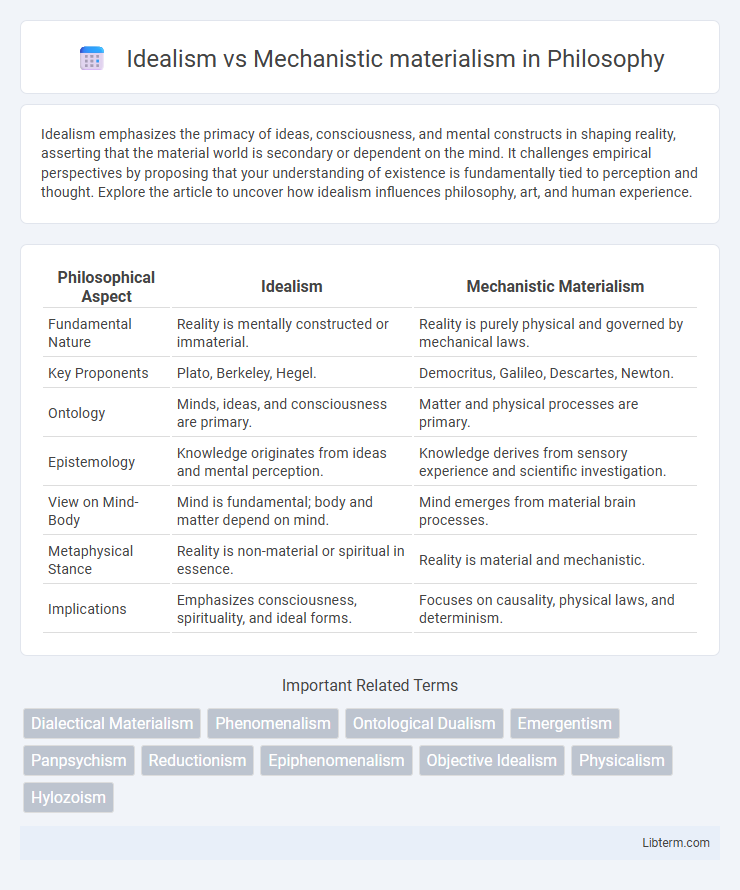Idealism emphasizes the primacy of ideas, consciousness, and mental constructs in shaping reality, asserting that the material world is secondary or dependent on the mind. It challenges empirical perspectives by proposing that your understanding of existence is fundamentally tied to perception and thought. Explore the article to uncover how idealism influences philosophy, art, and human experience.
Table of Comparison
| Philosophical Aspect | Idealism | Mechanistic Materialism |
|---|---|---|
| Fundamental Nature | Reality is mentally constructed or immaterial. | Reality is purely physical and governed by mechanical laws. |
| Key Proponents | Plato, Berkeley, Hegel. | Democritus, Galileo, Descartes, Newton. |
| Ontology | Minds, ideas, and consciousness are primary. | Matter and physical processes are primary. |
| Epistemology | Knowledge originates from ideas and mental perception. | Knowledge derives from sensory experience and scientific investigation. |
| View on Mind-Body | Mind is fundamental; body and matter depend on mind. | Mind emerges from material brain processes. |
| Metaphysical Stance | Reality is non-material or spiritual in essence. | Reality is material and mechanistic. |
| Implications | Emphasizes consciousness, spirituality, and ideal forms. | Focuses on causality, physical laws, and determinism. |
Introduction to Idealism and Mechanistic Materialism
Idealism posits that reality is fundamentally mental or immaterial, emphasizing consciousness and ideas as the primary substance of existence. Mechanistic materialism asserts that all phenomena, including mental processes, can be explained through physical interactions and natural laws governing matter. These contrasting worldviews shape debates in philosophy of mind, metaphysics, and science regarding the nature of existence and knowledge.
Historical Origins and Philosophical Roots
Idealism traces its origins to ancient Greek philosophy, notably Plato, who asserted that reality is fundamentally shaped by ideas or consciousness. Mechanistic materialism developed during the Scientific Revolution, with figures like Descartes and Hobbes emphasizing the universe as a machine governed by physical laws and matter in motion. These opposing views reflect deep philosophical roots: idealism centers on mind and perception as primary, while mechanistic materialism bases existence solely on tangible matter and mechanical processes.
Core Principles of Idealism
Idealism posits that reality is fundamentally shaped by the mind, ideas, or consciousness rather than material objects. Core principles include the belief that mental phenomena are primary, and the external world exists because it is perceived or conceived by the mind. This philosophical perspective contrasts with mechanistic materialism, which asserts that physical matter and its interactions constitute the basis of reality.
Core Tenets of Mechanistic Materialism
Mechanistic materialism asserts that all natural phenomena, including consciousness and life processes, can be explained entirely through physical matter and mechanical laws. It emphasizes deterministic causality, where every event results from prior physical causes within a closed system governed by physical laws, rejecting any non-material or spiritual explanations. This framework underpins classical physics and promotes the view that mental states and consciousness emerge solely from material interactions in the brain.
Key Differences between Idealism and Mechanistic Materialism
Idealism posits that reality is fundamentally shaped by consciousness or ideas, whereas mechanistic materialism asserts that physical matter and its interactions constitute the basis of all existence. Idealism emphasizes the primacy of mental or spiritual phenomena in understanding the universe, contrasting with mechanistic materialism's reliance on empirical observation and physical laws governing matter. The distinction lies in idealism's focus on subjective experience and meaning, while mechanistic materialism prioritizes objective, measurable processes in explaining the nature of reality.
Major Philosophers and Influential Thinkers
Major philosophers such as George Berkeley and Immanuel Kant championed idealism, emphasizing the primacy of mind, perception, and ideas in the construction of reality. In contrast, mechanistic materialism was prominently advanced by thinkers like Rene Descartes, Thomas Hobbes, and later by Julien Offray de La Mettrie, who argued that physical matter and mechanical laws govern all phenomena, including human thoughts and behavior. The debate between idealism and mechanistic materialism continues to influence contemporary philosophy, cognitive science, and metaphysics by challenging the understanding of consciousness and the nature of existence.
Impacts on Science and Consciousness Studies
Idealism posits consciousness as fundamental, influencing scientific approaches by prioritizing subjective experience and the mind's role in shaping reality, thus advancing fields like quantum mechanics and cognitive science. Mechanistic materialism views matter as primary, promoting empirical, physicalist explanations that have driven traditional scientific methods and technologies grounded in objective measurement. The tension between these perspectives shapes contemporary consciousness studies, challenging researchers to reconcile mind-matter dualism and develop holistic models integrating both subjective experience and physical processes.
Criticisms and Counterarguments
Idealism faces criticism for its reliance on subjective experience, which some argue lacks empirical verification and leads to solipsism, whereas mechanistic materialism is challenged for its reductionist approach that overlooks consciousness and qualitative aspects of reality. Critics of mechanistic materialism argue it cannot fully explain phenomena such as intentionality and free will, suggesting a need for integrating mental properties beyond physical processes. Counterarguments from idealists emphasize the primacy of mind in constituting reality, while proponents of mechanistic materialism defend the robustness of scientific methods in explaining causal interactions at fundamental levels.
Modern Relevance and Applications
Idealism continues to influence contemporary philosophy and cognitive science by emphasizing consciousness as fundamental to reality, shaping debates on virtual reality and artificial intelligence ethics. Mechanistic materialism remains pivotal in modern physics, neuroscience, and engineering, underpinning scientific methodologies that prioritize empirical observation and causal explanations. Both perspectives inform critical discussions in technology development, mind-body problems, and the interpretation of quantum mechanics.
Conclusion: Bridging Idealism and Materialism
Bridging idealism and mechanistic materialism requires recognizing that consciousness and matter are interdependent aspects of reality rather than mutually exclusive entities. Integrative approaches in philosophy and science suggest that mental phenomena emerge from physical processes while also influencing material conditions, highlighting a dynamic interplay. This synthesis fosters a comprehensive understanding of existence that transcends the limitations of purely idealist or materialist perspectives.
Idealism Infographic

 libterm.com
libterm.com